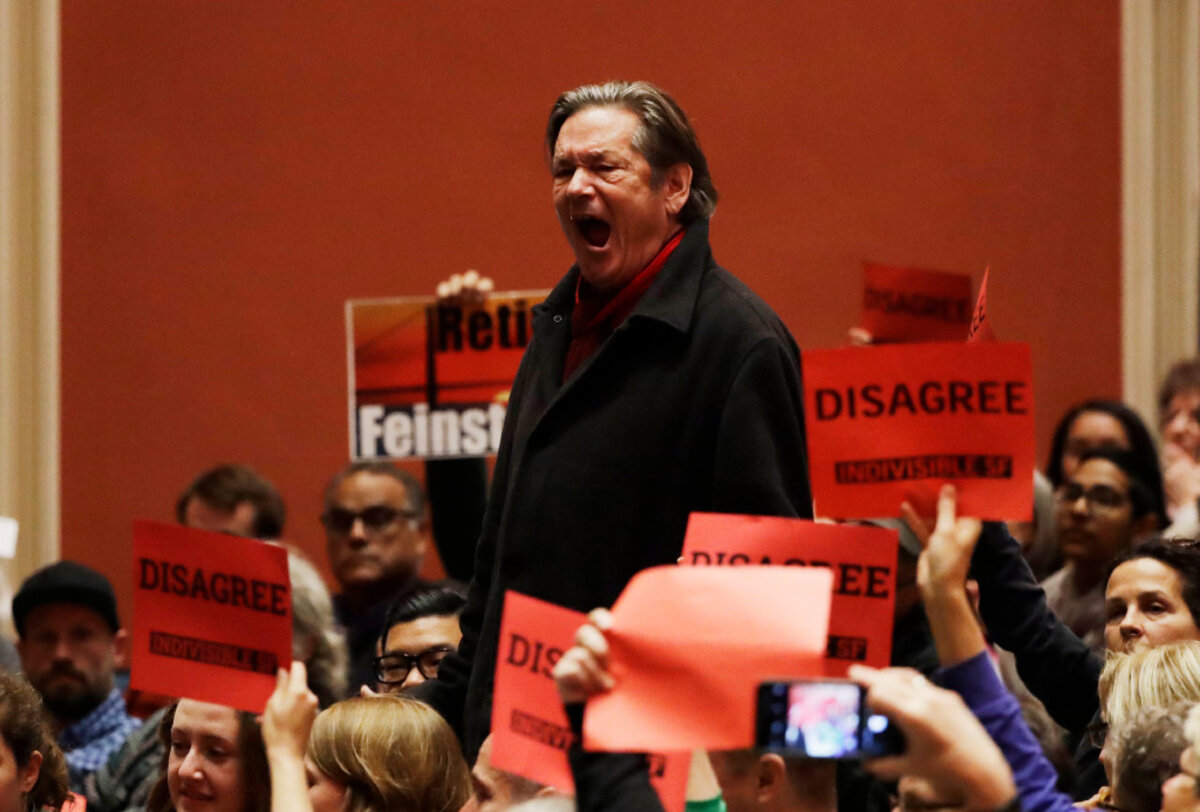It’s true that China is in the best position to bring North Korea’s dangerous behavior into line. But it’s also true that the rest of the world could do a lot more – if it wanted to. Saying the world is powerless ignores the steps that can be taken, and the Trump administration is delivering a message: ‘No more foot-dragging.’

Why is ���Ǵ��� Science in our name?
Our name is about honesty. The Monitor is owned by The First Church of Christ, Scientist, and we’ve always been transparent about that.
The church publishes the Monitor because it sees good journalism as vital to progress in the world. Since 1908, we’ve aimed “to injure no man, but to bless all mankind,” as our founder, Mary Baker Eddy, put it.
Here, you’ll find award-winning journalism not driven by commercial influences – a news organization that takes seriously its mission to uplift the world by seeking solutions and finding reasons for credible hope.
Explore values journalism About usAlready a subscriber? Log in
Already have a subscription? Activate it
Ready for constructive world news?
Join the Monitor community.
Subscribe Mark Sappenfield
Mark Sappenfield
It’s no wonder we don’t like Washington. What do we always hear? Lazy bureaucrats. Spineless politicians. Conniving lobbyists. What’s there to love? But here’s hoping that, just maybe, good politicians start to get a bit more credit.
President Trump’s tax plan is an example of why career politicians can be valuable. The plan is “a free-lunch mentality” of big tax cuts and little offsetting revenue, nonpartisan budget watchdog Maya MacGuineas tells The New York Times. “Who doesn’t love a tax cut, especially if no one has to pay for it?” she adds.
What does this tell us? Governing is hard, and we don’t help matters when we ask for the impossible. Washington generally tries to give us what we want. We need to ask for responsible things, or else reward politicians willing to tell us “no.”
Already a subscriber? Log in
Help fund Monitor journalism for $11/ month
Monitor journalism changes lives because we open that too-small box that most people think they live in. We believe news can and should expand a sense of identity and possibility beyond narrow conventional expectations.
Our work isn't possible without your support.
Today’s stories
And why we wrote them
( 6 min. read )
( 6 min. read )
Whatever one thinks of President Trump, one thing is clear: He’s a master at listening to what his supporters say and mirroring it back to them. Turns, out, he’s using the same skill in different ways as president. Though he’s still a divisive figure, he’s listened – and changed – repeatedly. One takeaway: You can’t change Washington all at once.
Overlooked
( 10 min. read )
Peace needs nurturing. You can't just declare peace and go home. In the Balkans, the West turned inward to deal with its own issues and basically just prioritized regional stability. But without care and feeding, the Balkans’ peace went wobbly. Now, the European Union could play a crucial role in keeping the area from reverting to its old tribalism and division.
( 5 min. read )
We know jobs are changing, and often, the attention is on what’s being lost. Good jobs that offer benefits and long-term stability are growing scarcer. But Millennials are also reshaping the workplace in fascinating ways. Many want the flexibility to do things outside work that matter to them. So some companies are starting something new: paid time off to protest.
( 5 min. read )
For the civil rights movement, “music was the glue that held everything together,” one member of a famous chorus has said. Music can inspire and define a generation. But in an age when everyone streams their own music, is that communal experience vanishing? “This period we are in now is clearly one of social disruption, but there’s no music,” says one professor.
The Monitor's View
( 2 min. read )
In a recent skit on “Saturday Night Live,” two actors in a mock TV ad invite Americans to live in a new planned city called The Bubble. The glass-encased city is designed to be a “like-minded community of free thinkers – and no one else.”
“If you’re an open-minded person,” says the pitchman, “come here and close yourself off.”
A video of this skit might be useful to show before many public events in the United States these days, such as talks by controversial speakers at public universities or at town hall meetings with elected leaders. It points to a need for greater use of an essential quality in a democratic society: the ability to listen to others out of a shared desire to discover truth and to find common solutions.
By and large, civility and free speech remain the norm in academia and politics. But after a few incidents of violence on campuses to prevent a public talk and of politicians being shouted down, the forces of civility need to rise up.
Two recent examples make the case. In mid-April, Sen. Dianne Feinstein (D) of California was forced to deal with a heckler at a public forum in San Francisco. And on the conservative side, commentator Ann Coulter had to cancel a planned appearance at the University of California, Berkeley out of a concern over possible violence.
Free speech should not need a police detail.
Such incidents have forced many university presidents to remind students and faculty of the need for a diversity of ideas in learning and for civility during public talks, even on uncomfortable topics. And in March, the student government at Northwestern University became the first to pass a resolution in support of “viewpoint diversity” on campus.
In Congress, meanwhile, about 50 members of the freshman class in the House, both Republican and Democratic, signed a letter in February called “Commitment to Civility.” It aims to restore trust in Congress as well as head off hecklers who would disrupt public forums in which elected leaders take questions from constituents. The new members pledge to “strive at all times to maintain collegiality and the honor of the office.”
Both Congress and colleges are involved with great moral struggles, from racial inequality to national indebtedness. Yet there is a more primary struggle over the moral necessity to hear different views in public forums. In a free society, even free thinkers must grapple with those who oppose freedom of speech. No bubble exists to avoid that struggle.
[Editor's note: An earlier version of this editorial mischaracterized the public forum with Sen. Feinstein.]
A ���Ǵ��� Science Perspective
Each weekday, the Monitor includes one clearly labeled religious article offering spiritual insight on contemporary issues, including the news. The publication – in its various forms – is produced for anyone who cares about the progress of the human endeavor around the world and seeks news reported with compassion, intelligence, and an essentially constructive lens. For many, that caring has religious roots. For many, it does not. The Monitor has always embraced both audiences. The Monitor is owned by a church – The First Church of Christ, Scientist, in Boston – whose founder was concerned with both the state of the world and the quality of available news.
( 3 min. read )
Can people find soundness of mind? Is our mentality governed by forces outside our control? Contributor Mary Alice Rose shares how a better understanding of God, and of our relation to God, brings healing, including the healing of mental illness. The Discoverer of ���Ǵ��� Science, Mary Baker Eddy, proved the power of divine Love to overcome mental instability when she briefly encountered an insane man who was obsessed with hatred for her. The turnaround was so freeing that he even ended up becoming a student of the ���Ǵ��� Science she taught. We too can prove man’s divine right to mental health – right here in the 21st century.
A message of love

A look ahead
Thanks for reading today. Check back tomorrow. We’re putting together a story that was reported during a 10-day trip across Appalachia – with video of conversations from lots of diner stops – ahead of President Trump’s 100th day this weekend.









